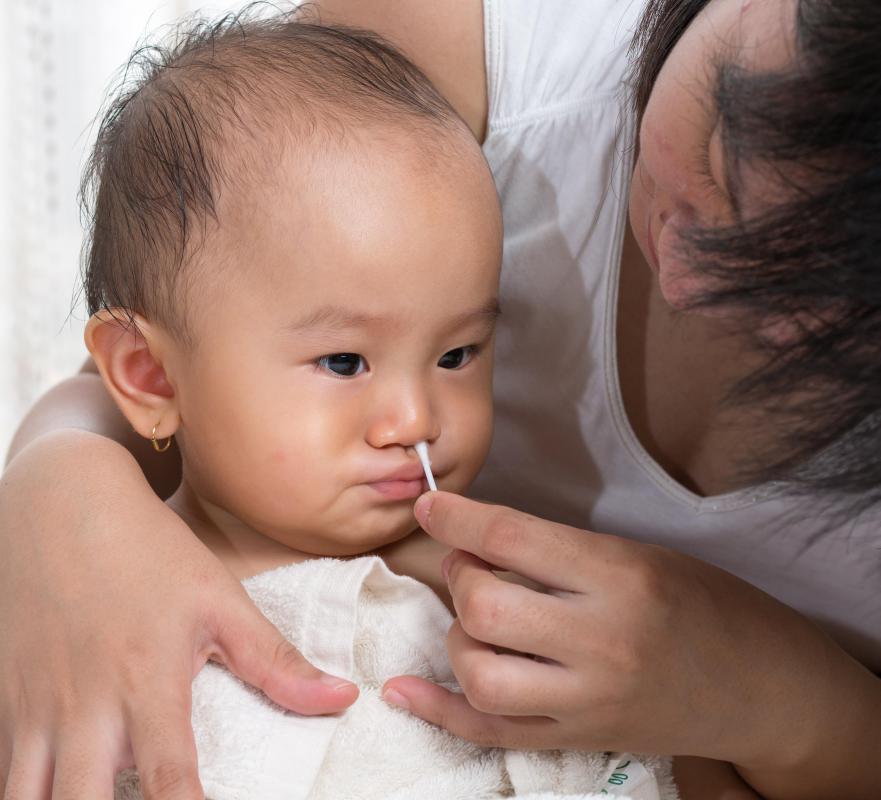At WiseGEEK, we're committed to delivering accurate, trustworthy information. Our expert-authored content is rigorously fact-checked and sourced from credible authorities. Discover how we uphold the highest standards in providing you with reliable knowledge.
What is a Nasal Syringe?
A nasal syringe, also called a nasal aspirator, is a device that is used to break up mucus and gently suck it out of the nose. Many versions are bulb syringes, which feature a tube attached to a bulb that can be squeezed to rid the nose of mucus. Bulb syringes function in the same way a turkey baster or an eye dropper does. Nasal syringes can be used on infants and adults to help clean out the nose and relieve congestion.
If a person develops a stuffy nose, a nasal syringe can be used to clear it out. He may want to use a saline solution, which is a mix of salt and water, to aid with this process. Also known as isotonic solutions, saline solutions can be either made or purchased. To make a saline solution, combine salt, water and a little bit of baking soda. The solution should not be too salty. Rather it should mimic the body’s natural fluids so that irritation is avoided.

After the solution is mixed up, it is ready to be sucked into the nasal syringe. The syringe should then be placed up the nose, and the solution sprayed into the nostril. Ideally, this process should be done over a sink because the next step is to allow the nose to drain. The solution can sometimes drain out of either nostril or down the back of the throat. Not only can this process help get rid of mucus, but it can also help to reduce any swelling that is causing congestion.

Parents can also use a nasal syringe on children who are too young to blow their nose. Cleaning out a baby’s nose is important because babies tend to breathe only through their nose and do not normally breathe through their mouth until they are older. The process can prove tricky, however, as babies tend to wriggle. For this reason, it may be a good idea to ask another person to help hold the baby while the mucus is removed.

The same basic procedure is followed for cleaning out a baby’s nose as an adult’s, except that after the solution has had a chance to break up the mucus, the caretaker will have to use the syringe to suck out the mucus from the baby’s nose. It is important that a nasal syringe not be used on a baby too often as the process can irritate his nostrils.
AS FEATURED ON:
AS FEATURED ON:

















Discussion Comments
@starrynight - I've tried nasal irrigation too. It's kind of gross, but it really does work!
I've never had the pleasure of using a nasal syringe on a baby though, since I don't have any. I've always thought that was pretty gross too, because you have to clean the snot out of the syringe after you use it. But then again, I suppose Moms get used to deal with all sorts of unpleasant bodily fluids anyway, so it's probably not too big of a deal for them.
@SarahSon - The last time I was sick I used a nasal syringe filled with saline solution to flush out my nasal passages. I was amazed at how much better it made me feel! Honestly, I thought all the stuff about Neti pots and nasal irrigation was a bunch of baloney!
However, after trying it once I'm a believer! I've also read it can be good for allergy sufferers to do this on a regular basis to avoid getting sinus infections.
@julies - I always hated using a baby aspirator on my kids too. It's just one of those things that you have to do because you know they will be able to breathe better once you have everything cleaned out.
I know some people who use a neti pot for nasal cleansing instead of using a syringe. This is something I haven't tried myself, but I know some people who really say it helps them keep their nose and sinuses clear.
Using a pot like this sounds like something I would be more interested in for myself than using a syringe.
I have never seen a little one who doesn't cry when a parent uses a baby nasal syringe on them to clear out their nose.
This always makes me feel bad because I know they are already miserable and don't know what to expect when you stick that syringe in their nose and squeeze.
Even though it is the best thing for them to get all the mucus out of their nose, I always had a hard time because I knew it would make them cry.
Post your comments